Helen Suzman Foundation Newsletter - May 2023
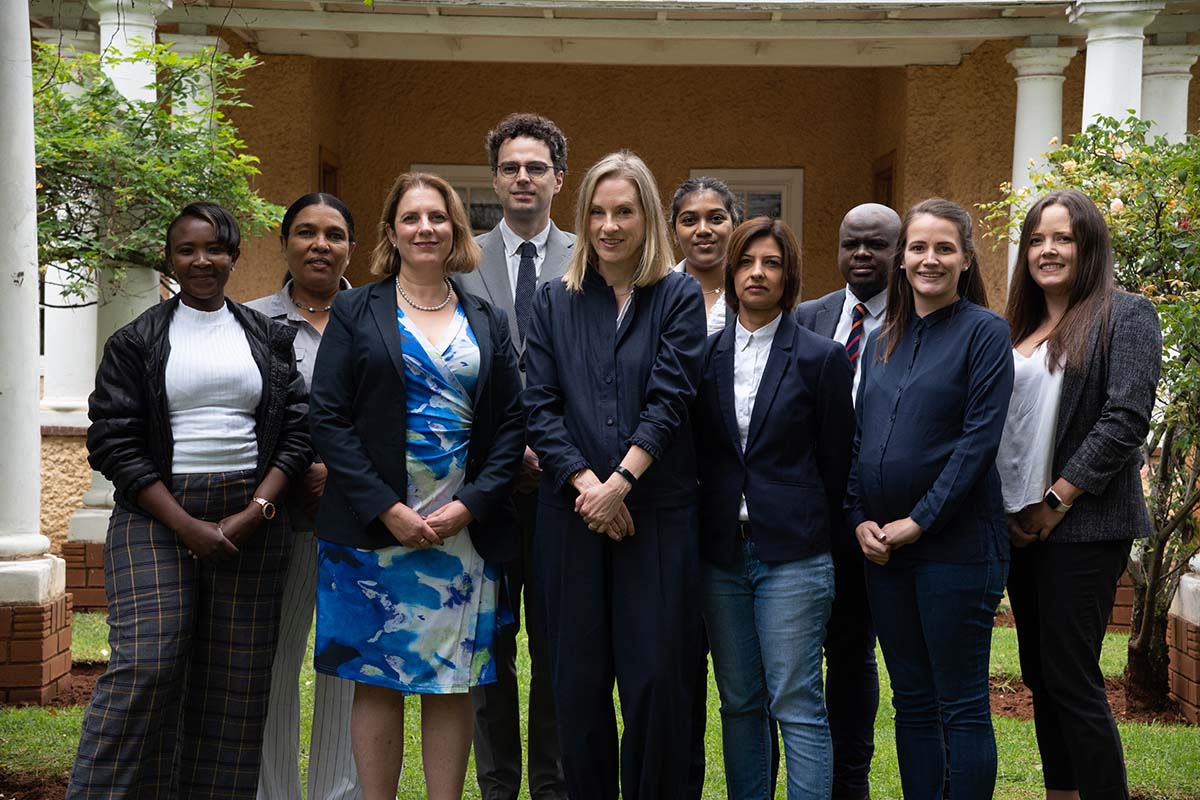
Dear Friends,
Above, a picture of the HSF team. To my right is HSF’s new Director of Legal Programmes, Naseema Fakir. Those acquainted with the NGO world will know of Naseema and her work. She’s worked at the South African Human Rights Commission, Lawyers for Human Rights and the Legal Resources Centre and has qualified as an attorney and advocate. She brings a wealth of experience and we couldn’t be more delighted to have her join HSF.
As the newsletter below details, even in précised form, there’s no shortage of work right now. Capturing lots of headline space is the prospect of a visit by Russian President Vladimir Putin to attend the BRICS Summit scheduled for August in Durban, even as he faces an International Criminal Court indictment for the war crime of transfer of children from occupied Ukrainian territory. Among the many dimensions of this matter are significant rule of law and constitutional implications, brought to fore chiefly by our own Implementation of the Rome Statute Act. I’ve addressed some of these in this opinion piece for City Press.
As always, we’d love to have your thoughts.
 Nicole Fritz
Nicole Fritz
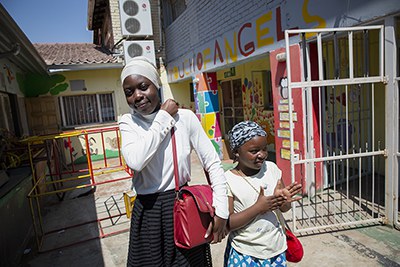 Judgment Reserved for ZEP Holders
Judgment Reserved for ZEP Holders
HSF’s application to review and set aside the termination of the Zimbabwean Exemption Permit (ZEP) was heard by the Pretoria High Court between 11 and 12 April 2023. For the approximately 178 000 ZEP holders who have had to contend with Minister Aaron Motsoaledi’s decision to terminate, without even an attempt at consulting with them about the catastrophic impact it would have on their lives, the hearing offered the first real opportunity to weigh the full gravity of the decision and its consequences. HSF’s oral arguments again underlined the importance of this case for all South Africans: none of us is safe if government actors can make hasty decisions that adversely impact on our rights without offering us the opportunity to be fairly consulted ahead of the decision.
Judgment was reserved and at the time of writing, ZEP holders are waiting anxiously for the court’s decision as the ZEP’s 30 June 2023 termination date nears.
HSF’s court papers can be read here and a list of frequently asked questions about our case can be read here.
Christopher Fisher
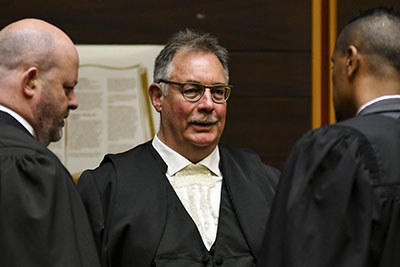 HSF Opposes Private Prosecutions Brought for Ulterior Purposes
HSF Opposes Private Prosecutions Brought for Ulterior Purposes
On 20 March 2023, HSF appeared in the Pietermaritzburg High Court as amicus curiae in Adv Billy Downer’s application to interdict former President, Jacob Zuma from privately prosecuting him. There, HSF argued that Mr Zuma approached the court with the ulterior purpose of engineering yet another delay in his long-running corruption trial – not to establish Mr Downer’s alleged guilt. In support of this conclusion, HSF looked no further than Mr Zuma’s own court papers, in which he nakedly sets forth a legal strategy designed to replay the fiction that the corruption charges against him were born of a political conspiracy.
Since then, Mr Zuma has, predictably, revealed his hand. In an application filed on 14 April 2023, Mr Zuma now seeks to remove Mr Downer as his prosecutor for being an accused in the private prosecution that he engineered. The application is yet another expression of Mr Zuma’s endless effort to avoid his day in court and only affirms the importance of opposing efforts to use private prosecutions as a tool by which to avoid accountability.
At the time of writing, HSF is awaiting judgment. Our court papers can be read here.
Christopher Fisher
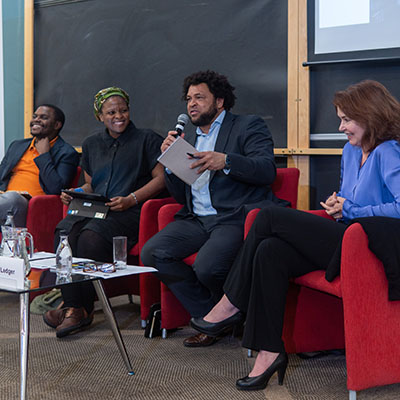 HSF Roundtable: ‘Re-imagining Local Government’
HSF Roundtable: ‘Re-imagining Local Government’
In March this year, residents of Ekurhuleni watched a second motion of no confidence in less than a year and a half bring them a new mayor. The metro has become a high‑profile illustration of how local governments across South Africa have succumbed to political and administrative dysfunction. Yet, local government remains indispensable to delivering the basic services essential to realising the Constitution’s vision of a dignified existence for all who live in South Africa.
It is, therefore, crucial that civil society keeps an open dialogue on the state and prospects of local government in South Africa. To this end, HSF hosted a Roundtable discussion on 25 April 2023 where we asked how local government might be re-imagined to better achieve its objectives. We were delighted to be joined by Lukhona Mnguni, Executive Director of the Rivonia Circle, Dr Tracy Ledger, Senior Researcher and Programme Lead at PARI, Lance Joel, COO of SALGA, and Philile Ntuli, a full-time commissioner at the SAHRC.
Our panel’s discussion will be of interest whether you are concerned about professionalising local government bureaucracies; the effects of unstable coalitions on effective local governance; fixing service delivery; or models for sustainably funding a developmental local government.
If you missed it, a recording is available here.
Sophie Smit
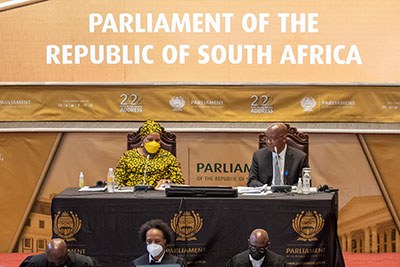 HSF Participating in Democracy (Chris)
HSF Participating in Democracy (Chris)
HSF remains engaged with government as it carries out its duty to foster participatory democracy when passing legislation or issuing regulations. Since our last newsletter, HSF has made submissions in which we –
-
Opposed legislation that would roll back the Independent Police Investigative Directorate’s hard‑won independence. Our submission is available here.
-
Advocated for meaningful electoral reform that makes national and provincial legislatures directly accountable to voters. Our submission is available here.
-
Welcomed the decriminalisation of sex work but cautioned that timeous regulation, which intentionally safeguards the rights of sex workers, must still follow. Our submission is available here.
-
Opposed relieving Eskom of its duty to report on irregular and wasteful expenditure. Our submission is available here.
-
Signaled caution in using the law – and by extension our courts – to manage conflict in coalition government. Our submission is available here.
Christopher Fisher
HSF’s Inaugural Book Club and Our Representation at the Human Rights Festival
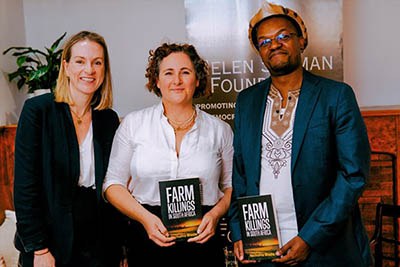 HSF Book Club
HSF Book Club
HSF held the inaugural installment of its Book Club on 23 February 2023 with author, journalist and academic, Nechama Brodie on her book “Farm Killings in South Africa.” In conversation with Khaya Sithole, Nechama pertinently noted that “in order to be called a farm killing in South Africa, the most important feature is the whiteness of the victims.” Nechama and Khaya’s rich discussion, held at HSF’s offices, ranged from the exploration of South Africa’s history of violence, and the reporting thereon, to how artificial intelligence now influences our perceptions of violent incidents.
If you missed it, a recording of the discussion is available here.
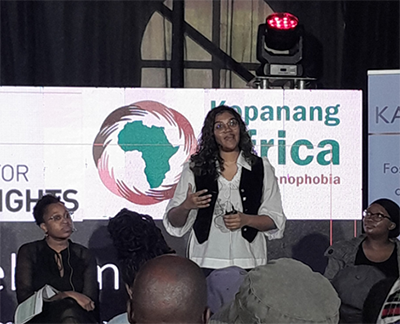 HSF at the Human Rights Festival
HSF at the Human Rights Festival
HSF was well represented at the Human Rights Festival held at Constitutional Hill from 24 – 26 March 2023. HSF hosted a stall over the weekend, where attendees were able to engage with us on our research and litigation initiatives. HSF also contributed to two panel discussions: one titled, ‘The State of Access to Documentation for Migrants and the Failed Asylum System’ held by Kopanang Africa Against Xenophobia with the Foundation for Human Rights; the other, ‘Documentation: a Key to Protection’ hosted by CoRMSA. Both panel discussions were well attended and gave HSF the opportunity to collaborate, and stand in solidarity, with other members of civil society on matters of common interest.
Divashnee Naidoo
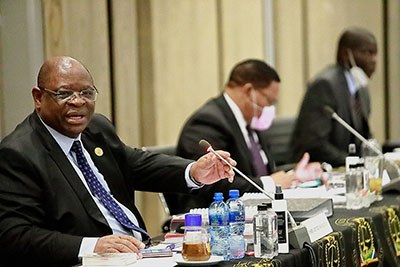 Judges Behaving Badly
Judges Behaving Badly
The Judiciary has been in the spotlight recently for all the wrong reasons. Judge Makhubele’s hearing before the Judicial Conduct Tribunal (JCT) finally began on 21 February 2023. There, witnesses testified that she accepted a position at the corruption-riddled Passenger Railway Agency of South Africa at the same time as being appointed as a judge. Soon afterwards, we learned that a Free State High Court Judge was facing charges of theft, money laundering and contempt of court committed whilst the Judge was still an attorney. That such fundamental misconduct went undetected in the respective judges’ interviews before the Judicial Service Commission (JSC) is of grave concern.
More disturbing still was the revelation early this year that Eastern Cape Judge President, Selby Mbenenge is also the subject of a Judicial Conduct Committee investigation into a complaint of sexual harassment. This particular matter raises questions not only as to the propriety of an individual judge but as to the functioning of the Office of the Chief Justice (OCJ), in that media reports implicated several OCJ officials in a frankly alarming attempt to have the complaint mediated and not directed through proper disciplinary processes (See Nicole’s oped on this matter here).
The adoption by the JSC at its most recent sitting of guidelines and criteria by which to assess candidates for judicial appointment is a much anticipated and welcome development – in line with the HSF recommendation contained in its report, In the Interests of Justice: Reform of the Judicial Service Commission. But complaints of the type enumerated above make it that much more urgent that more thorough-going reform in respect of appointment and disciplining of judicial officers also be contemplated. Again, the HSF report provides relevant analysis and recommendation.
Chelsea Ramsden

